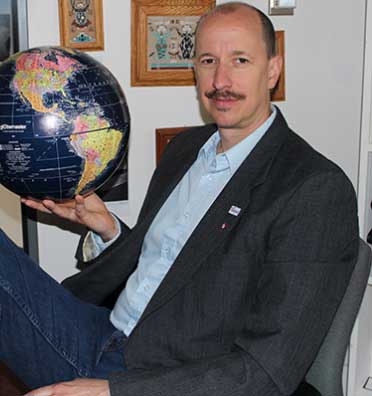Criminal justice concentration approved

David Plazek
It’s official: as of February, the criminal justice concentration program has been approved for JSC’s curriculum.
The option to pursue the path of criminal justice will exist within two majors: anthropology/sociology, and political science.
“Originally the degree, we were hoping, would be stand-alone, but that wasn’t possible…” said David Plazek, associate professor of humanities. “And as we discussed, we didn’t want to limit students… Different careers would require different backgrounds, and this gives greater career-building flexibility.”
Plazek explained the importance of involving multiple departments, besides the need to have flexibility in career options.
“One of the core ideas is,” said Plazek, “in the face of Ferguson and other instances where it’s abundantly clear there’s issues with police culture, we consciously wanted to design a program that would help train people for the field they want to get into, but also make them aware of other aspects of their job that have social and political ramifications.”
According to Dean of Academic Affairs Dan Regan, the program will focus on restorative justice rather than “handcuff” justice. Kaja Tretjak, assistant professor of behavioral sciences, elaborated on this.
“The program also focuses on exploring the relationships between crime, law, and social justice,” she said, “reflecting vibrant local efforts in the areas of restorative justice and community development.”
According to Tretjak, the program will use existing courses, but new ones are also being introduced, including Introduction to Criminal Justice, Constitutional Law, and Community and Restorative Justice.
“Also new is the Criminal Justice Lecture Series: Careers in the Field,” Tretjak said, “a one-credit course designed to expose students to a range of possible career options through guest speakers in a range of criminal justice fields.”
Introduction to Criminal Justice will be offered in the fall, while the other classes will be introduced gradually over time.
Two seminars that were introduced this semester, Forensic Psychology and Criminal Justice: “Who Is a Criminal?” are now being made permanent classes for this program.
Regan, Tretjak, and Plazek all said that most of the interest they’ve seen for this program has come from prospective students and their parents.
“Just in my first few weeks at JSC, I was immediately contacted by numerous students, as well as several faculty and staff members who are in touch with interested prospective students,” said Tretjak. “Interest continues to be tremendous, and we hope to expand the program even further over time.”
Regan explained that the process to create the criminal justice program involved the input of multiple faculty and staff members.
“Our process is that a curricular change, such as a concentration, goes from the recommending department to the curriculum committee, and then once approved by the curriculum committee comes to me, as the academic dean, for review,” he said.
It wasn’t just members of JSC faculty and staff that were involved in the process, however; Regan explained that they looked into the opinions of community members as well.
“This program in particular demanded and included the input of many community partners,” Regan said. “Dave Bergh, dean of students and college relations, Kaja, and David Plazek convened a meeting of community partners and sought their input about a criminal justice concentration early on.”
“It fits a community need,” said Plazek, “and also fits the desires of potential students.”
Others involved in the creation of this new program include Internship Coordinator Ellen Hill and Professor Susan Green, co-chair of the Behavioral Sciences department.



